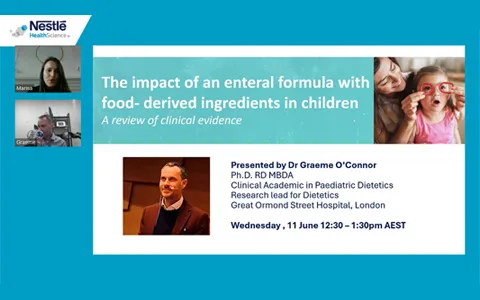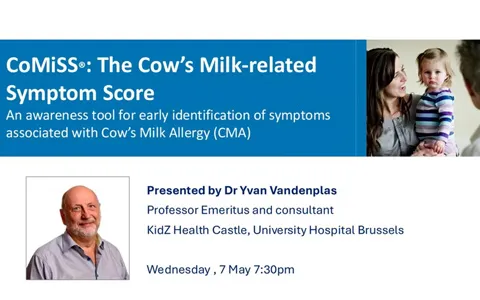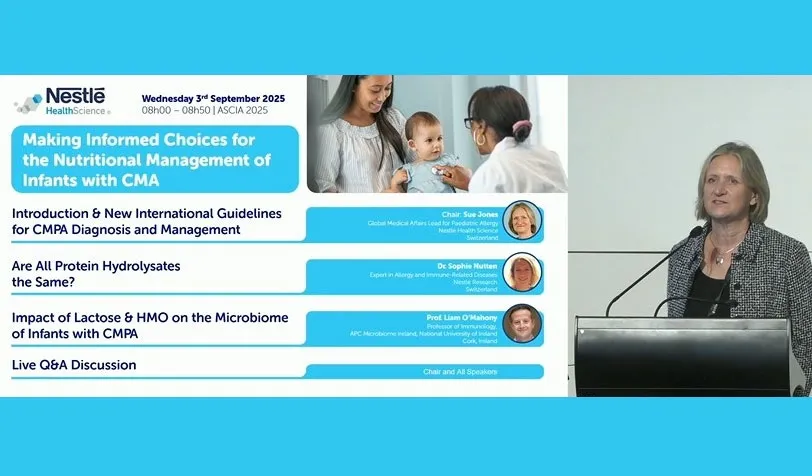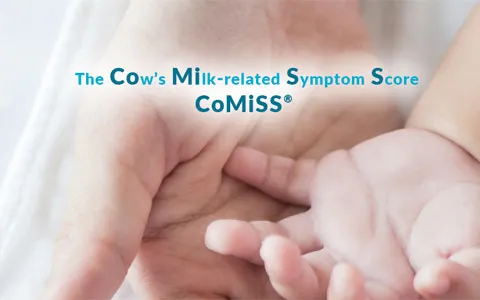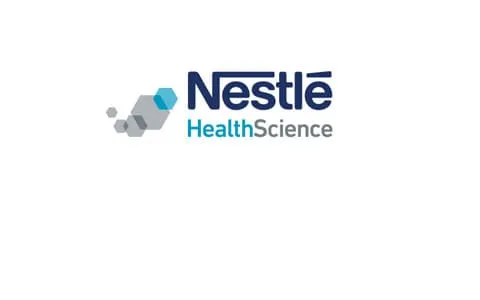Paediatric Nutrition
Highlight of the month
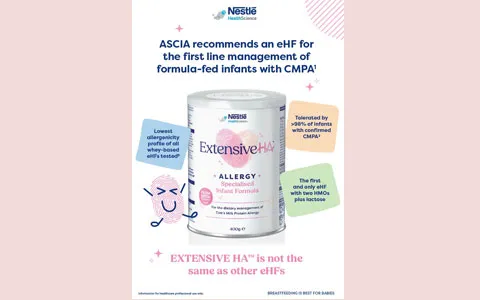
EXTENSIVE HA™: Specialised Nutrition for CMPA
EXTENSIVE HA™ is a specialised whey based, extensively hydrolysed infant formula (eHF), suitable for mild to moderate Cow’s Milk Protein Allergy (CMPA).EXTENSIVE HA™ is a special medical purpose product for infants, formulated for infants with Cow’s Milk Protein Allergy, for use only under medical supervision.
See moreVideos
Join Paediatric Gastroenterologist and Allergist, Dr Ralf Heine, for an insightful session exploring the emerging benefits of Human Milk Oligosaccharides (HMOs) and Lactose in formula-fed infants with Cow’s Milk Protein Allergy (CMPA). This webinar will highlight how these components support immune system development in a compromised population, offering a deeper understanding of their role in allergy management.
In this webinar, Jodie Bartle, Paediatric Dietitian, Oncology/Immunology at The Royal Children's Hospital Melbourne, takes us through the findings of her clinical research and how she arrived at a Nutrition Feeding Algorithm for Children and Adolescents undergoing Haematopoietic Stem Cell Transplantation (HSCT), to assist clinicians to make objective and consistent enteral feeding decisions.
Watch our webinar as Dr. Graeme O'Connor Ph.D., RD, MBDA reviews the clinical evidence on the impact of an enteral formula with food-derived ingredients in children.
An online video created by Nestle Health Science for parents explaining what cow's milk protein allergy is and how this can be managed through the usage of specialised formulas. These specialised formulas such as ALFAMINO which was developed by Nestle Health Science is for use in infants with severe cow's milk protein allergy and multiple food protein allergy.
In this webinar, Professor Yvan Vandenplas will provide an in depth explanation of the CoMiSS® tool and its practical application for infants in the primary care setting to help increase awareness of the most common symptoms of CMA that can aid an earlier diagnosis.
Presented by Prof. Michael Gold and Dr. Ralf Heine, this webinar explores the clinical impact and microbiome effects in infants with cow’s milk protein allergy who consume formula containing two Human Milk Oligosaccharides.
In this webinar, Paediatric Immunologist and Allergist Dr Annaliesse Blincoe and Consultant Dietitian Anna Richards will take you through a case study of a paediatric patient’s journey through food allergy, focusing on cow’s milk protein allergy from a medical and dietetic perspective.
This webinar discusses current evidence for the management of Eosinophilic esophagitis (EoE). In addition, it includes clinical presentation and prevalence, evidence-based dietary therapy and nutrition management of EoE. The role of elemental diets in the management of EoE, including practical guidance on how to initiate and support compliance is also discussed and the role of the microbiome in EoE and how it correlates with disease activity is also explored.
This presentation discusses existing and new evidence supporting early and regular introduction of diverse food allergens at low doses. Of note, protein mixtures appear to show superior induction of an anti-allergenic state versus single foods, likely mediated by improvement in key biomarkers associated with sensitization.
Presented at Pediatric Allergy & Asthma Meeting (PAAM) Digital 2021. This is 20-year follow-up data from the GINI study showing that early nutritional intervention with extensively hydrolyzed casein formula (eHF-C) or partially hydrolyzed whey formula (pHF-W) when compared to cow’s milk based formula exerts a preventive effect on both eczema and allergic airway manifestation that endures until adulthood.
This presentation discusses the importance of diet diversity (including food allergen diversity) with early introduction of allergenic foods between 4 to 6 months of age as part of a complementary diet recommended by the majority of medical and scientific societies worldwide, including EAACI.
A short online video developed by Nestle Health Science visually showing the benefits of structured lipids in the gut based around Alfamino. The video highlights the O-P-O structure as well as how it may assist in increasing bone mineral content and strength, increase sleep duration, improving healthy gut bacteria and reduce crying.
Article
Making Informed Choices for the Nutritional Management of Infants with CMPA
CoMiSS® is the Cow’s Milk-related Symptom Score. It is a simple, fast, easy to use, non-invasive tool which helps increase awareness of the most common symptoms seen in infants with CMPA, supporting earlier diagnosis. The CoMiSS® tool was first developed by international experts in 2015 to support healthcare professionals (HCPs) with the diagnosis of CMPA. Since 2015, 25 clinical studies have been conducted using the CoMiSS™ tool. It is intended to be used by healthcare professionals in conjunction with caregivers.
Compleat® paediatric is a nutritionally complete 1.2kcal/ml standard enteral tube feed, containing food-derived ingredients (rehydrated chicken meat and vegetables, peach puree, orange juice from concentrate). Compleat® paediatric is a Food for Special Medical Purposes for use under medical supervision.
Nutritionally complete paediatric tube feed with a unique blend of whole foods
Purposefully designed with wholesome and familiar food ingredients to meet the nutritional needs of children requiring enteral nutrition.
The Nutritional Support in Children with Neurological Impairment brochure is an ideal resource on how to support children with Cerebral Palsy in their nutritional management, taking a wholistic and multi-disciplinary approach. This resource is ideal for those in the field of Neurology, Gastroenterology, Physiotherapy, Nursing, Speech Therapy, Social Work, and Nutrition and Dietetics.
An online brochure that explores how whey peptide formulas may help to achieve better outcomes for patients who are unable to digest or absorb standard enteral formulas. This brochure has been developed specifically for Peptamen Junior which is a specialised enteral nutrition formula designed for children aged 1-10 years with gastrointestinal impairment.
A case study in which an infant who was irritable, experiencing poor weight gain and difficulty feeding at the breast and the bottle was diagnosed with non-Ige mediated cow's milk allergy and given ALFAMINO. This case study highlights the usage of ALFAMINO over the course of 6 months with relevant results. Ordering information for both ALFAMINO and ALFAMINO JUNIOR is provided at the conclusion of the study.
Diagnosing Cow's Milk Protein Allergy (CMPA) is a handy ready reckoner on the signs and symptoms of CMPA, CMPA Diagnostic Algorithm adapted from the ESPGHAN guidelines and the specialised formula options for the nutritional management of children with allergies.
Information on the potential nutritional gaps in children aged 1-10 years with CMPA. This document also shows how these nutritional gaps can be met by highlighting the key nutritional benefits that ALFAMINO JUNIOR offers to enable optimal growth in children aged 1+ years with multiple food allergies.
This resource explains how the Calcium Calculator tool works and why it can be beneficial for parents of children with Cow’s Milk Allergy (CMA). The Calcium Calculator is an online tool containing a list of food that can be sources of calcium, and helps measure the calcium intake of a child with CMA.
External Link
Children with medical complexity switched to AA-MCT formula demonstrated growth. Formula was well tolerated, as shown by increased intake of formula, appropriate growth for age and BMI z-scores up to 1 year post-switch.
Nutrition support during the acute phase post allogeneic haematopoietic stem cell transplantation (HSCT) is required to optimise short- and long-term outcomes for children. An algorithm was developed and evaluated to assist clinicians to make objective and consistent enteral feeding decisions and has shown to help support better weight outcomes and reduced LOS in this patient cohort.
Paediatric Nutrition in Practice (PNP) eLearning Program aims to provide information to healthcare professionals who are looking for practical guidance on relevant issues surrounding the nutrition management of infants, children and adolescents. This eLearning Program has 12 modules that can be completed.
This study was to determine the effect of an intermittent defined formula diet on growth and disease activity in children with Crohn’s disease and growth failure. The results indicate that an intermittent defined formula diet can improve growth failure and significantly decrease disease activity in children with Crohn's disease.
Neurological disability is often associated with feeding and gastrointestinal disorders leading to malnutrition and growth failure. These clinical guidelines by ESPGHAN provide necessary nutritional and clinical guidance including assessment and monitoring of nutritional status, definition of nutritional requirements, diagnosis and treatment of gastro-oesophageal reflux disease, and indications for and modalities of nutritional support.
Children with developmental delays are often dependent on enteral nutrition. This study evaluated the benefits of switching to a 100% whey, peptide-based formula from an intact protein based formula, which resulted in improved symptoms of feeding intolerance in the majority (92%) of developmentally delayed children eligible for the study.
This single blind case control study aim was to compare the effect of a peptide-based formula versus a standard polymeric formula on feeding tolerance parameters and other clinical outcomes among critically ill children. The study found that the peptide-based formula feeding was better tolerated than standard polymeric formula feeding in critically ill pediatric patients. However, the choice of patients receiving the peptide-based formula needs to be further evaluated.
This study showed whey-based formulas reduce the number of episodes of vomiting by improving the rate of gastric emptying in patients 3 years or older with profound mental retardation, spastic quadriplegia, developmental delay, and scoliosis in comparison to patients that were fed casein-based formula.
This retrospective observational audit describes the characteristics of the paediatric patients who have been prescribed a hydrolysed whey protein, medium chain triglycerides (MCT) based formula, Peptamen Junior® and the nutritional outcomes. This study demonstrates that semi elemental formula Peptamen Junior® appears to be well tolerated in paediatric patients with a variety of medical conditions that have complex pathologies and may have wider scope of use in a more diverse group of medical conditions than currently indicated.
HMO academy- Human Milk Oligosaccharides (HMOs)are an exciting and central area of research in infant nutrition. Scientific advances on HMOs are helping us know more about the role and importance of these essential components of Human milk. The HMO Academy has been created to share evidence-based information in interactive and user-friendly way from more than a decade of research on HMO.
In a randomised multicenter trial by Puccio et al. 2017, it demonstrates that infant formula with 2'FL and LNnT is safe, well-tolerated, and supports age-appropriate growth. Secondary outcome findings show associations between consuming HMO-supplemented formula and lower parent-reported morbidity (particularly bronchitis) and medication use (antipyretics and antibiotics).
An Australian based open-label, non-randomized, multicenter trial by Gold et al. 2022 uses an amino acid-based formula (AAF) supplemented with two human milk oligosaccharides (HMO) to demonstrate normal growth, good tolerance and significant microbiome shift in infants with a cow’s milk protein allergy (CMPA).
In a randomised clinical trial by Vandenplas et al. 2022, using an extensively hydrolyzed formula (EHF) supplemented with two human milk oligosaccharides (HMO) in infants with cow’s milk protein allergy (CMPA), it demonstrated a reduction in frequency of upper respiratory tract infections and a lower incidence of ear infections at 12 months as well as supporting normal growth in infants with CMPA.
This study demonstrates that the use of Sn-2 formula compared to standard infant formula may be associated with improved behaviors and stool characteristics in infants.
This study looks at the effect of increasing the amount of palmitic acid esterified in the sn-2 position in infant formula on neurodevelopment in healthy full-term infants and explores association of this effect with the altered gut Bifidobacteria.
This study looks at gastrointestinal tolerance, acceptability and safety of high sn-2 infant formulas among healthy term infants by measure of stool frequency and associated characteristics, and general gut symptoms.
An online symposium from Nestlé Health Science presented by Dr. Rosan Meyer, Prof. Kari Nadeau and Dr. Carina Venter that looks at the nutritional strategy to prevent food allergy. This webinar discusses the topics such as the introduction of solid foods, making sense of allergy prevent guidelines around the world and diversity of foods .
In this randomised, double-blind controlled trial, it evaluated the impacts of infants consuming high beta-palmitate (Sn-2) formula on anthropometric measures and bone strength. After 12 weeks of consumption, changes in bone SOS (speed of sound) were comparable to those infants consuming breast milk and favourable compared to infants consuming low beta-palmitate (Sn-2) formula.
The objective of this study was to compare anthropomorphic measures and dietary intake of calcium, vitamin D, total calories, protein and fat between children with and without reported food allergy using The National Health and Nutrition Examination Survey (NHANES). This study which showed that mean weight, height, BMI & height-for-age percentile and calcium intake were significantly lower in children aged 2-17 years compared with those without CMPA.
A double-blind randomised clinical trial in which he results indicated that consumption of a high beta-palmitate formula affects infant crying patterns during the first weeks of life, reducing crying duration and frequency, primarily during the afternoon and evening hours, thereby improving the wellbeing of formula fed infants and their parents.
This study looked at the heterogeneity of extenstively hydrolysed formulas (eHFs) and compared the molecular weight profiles among eHF's from different manufacturers. The survey highlights the need for a more meaningful definition of EHF products. However, the clinical implications of it's findings are uncertain and further studies are required.
This study demonstrated that infant formula enriched with sn-2 palmitate fed in infantcy is safe, improves stool consistency (from 2 weeks to 2 months) and increase bone mineral content (at 4 months).
A double-blind, randomised trial of a synthetic triacylglycerol in formula-fed term infants that demonstrated infants fed the higher sn-2 formula compared to a standard formula, measured bone mineral content, softer stools and lower stool fatty acid soaps, similar to that of breast-fed infants. The study noted that the greater bone mass measured could be important if it persisted beyond the trial period and would merit further investigation.



